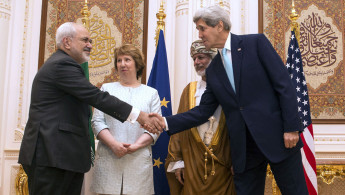US headed towards Iran deal
Two days of talks in Oman between the US, the EU and Iran that ended Monday were reported to have yielded little progress toward resolving the issue of Iran’s nuclear programme.
Yet the record of negotiations so far suggest that even if a November 24 deadline for finding agreement is not met, talks will likely continue. There appears to be clear determination on both sides to find a solution that will see sanctions on Iran ended and Iranian nuclear weapons fears in the region and west allayed.
Last week, US President Barack Obama reportedly wrote a letter to Iran’s Supreme Leader, Ayatollah Ali Khamenei in which he requested Iran's cooperation against the Islamic State group (IS, formerly known as ISIS), allegedly in exchange for American flexibility in reaching a deal on Iran's nuclear program.
| We let them know: don't mess with us, we're not here to mess with you – Barack Obama |
While administration officials denied that such a letter was ever sent, let alone wanted to engage in speculation about its content, it wouldn't be the first time Obama had directly engaged Iranian leaders.
Back in September 2013, the American president talked on the phone with Iranian counterpart, President Hassan Rouhani, in what was seen as the first sign of a warming of relations between Washington and Tehran since former Iranian President Mohammad Khatami left office in August 2005.
This latest, and much talked about, letter is alleged to have contained Obama's extended hand to fight the IS in Iraq and Syria, a common enemy for US and Iran. Indeed Obama – who hasn’t denied that a letter was sent saying he doesn’t comment on any communications he has with other leaders – acknowledged last Sunday on CBS’s 'Face the Nation' that defeating the IS is a common goal with Iran.
"Iran has influence over Shia, both in Syria and in Iraq, and we do have a shared enemy in ISIL," Obama said, adding: "But I've been very clear publicly and privately we are not connecting in any way the nuclear negotiations from the issue of ISIL. We're not coordinating with Iran on ISIL. There's some de-conflicting in the sense that since they have some troops or militias they control in and around Baghdad, we let them know: don't mess with us, we're not here to mess with you."
The first thing, according to the president, with regard to US concerns over Iran, is the nuclear issue. Obama said, "Our number one priority with respect to Iran is making sure they don't get nuclear weapon. And because of the unprecedented sanctions that this administration put forward and mobilized the world to abide by, they got squeezed, their economy tanked, and they came to the table in a serious way for the first time in a very, very long time.”
He added: "We've now had significant negotiations; they have abided by freezing their program and, in fact, reducing their stockpile of [] weapons-grade nuclear material."
His comments put the US right wing and AIPAC supporters in a predictable tizzy.
"The commander-in-chief of the planet's mightiest army, the leader of the world's largest economy", sitting down at his desk, chin in hand, trying to come up with just the right words to persuade Ayatollah Ali Khamenei to make nice with America, time and again, "even after his letters prompt a combination of silence and scorn" according to a CNN commentary.
Cal Thomas, a virulent pro-Zionist and fully paid-up member of the 'Israel right-or-wrong' club added this: "Given the Obama administration's horrible record in the Middle East – treating Israel as an enemy and Islamic dictatorships as potential friends – things don’t look good for an agreement that will curtail or reverse Iran's pursuit of nuclear weapon."
They – the rightwing and Netanyahu echo-chamber crowd – may feel that the sweeping Republican victory in last week’s midterm elections has empowered them to frustrate or even scuttle altogether any potential deal with Iran. Indeed, much of the president’s agenda has been blocked by Republicans who insist that, "Obama is throwing Israel under the bus".
They know their complaints about Obama’s right to waive sanctions on Iran are misleading. They are the ones who passed the sanctions legislation in 2010 and 2011, waiver and all. They also know that only Congress can lift sanctions permanently, a feat that seem more unlikely today than a week ago. Those opposed to a deal with Iran keep citing reports alleging that the West is already proposing to allow Iran a level of nuclear enrichment that would have been unthinkable in the recent past, while accusing Obama of crossing the line with his recent letter to Khamenei (allegedly) suggesting a linkage between a nuclear agreement and cooperation between Washington and Tehran in fighting IS.
All this noise notwithstanding, this administration seems squarely intent on reaching a deal with Tehran, one that will see sanctions against Iran lifted in exchange for a verifiably non-nuclear armed Iran.
Sure, two days of "tough talks" in Muscat to limit Iran's nuclear program did not seem to achieve much. US officials resisted describing how much (or how little) progress was made during the high-level discussions between US Secretary of State John Kerry, European Union policy adviser Catherine Ashton and Iranian Foreign Minister Javad Zarif.
But there is plenty of time left between now and November 24, the deadline for negotiations to yield fruit that was established last July. And if a deal is not reached then, past record suggest the talks will be extended for several weeks, perhaps months.
Here is why: A deal would see Iran limit its uranium enrichment level to such a degree that it could not build any nuclear weapons. In return, Iran will be freed from what are suffocating economic sanctions. In addition, the US and Iran can enlist each other’s help to defeat the IS group.
It is win-win situation.



